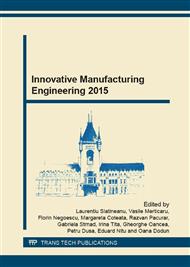[1]
S. Katayama et al., Surface hardening of titanium by laser nitriding, in Laser Processing of Materials ICALEO'83, Conf. Proc., Los Angles, USA, 1983, pp.127-134.
Google Scholar
[2]
A. Lisiecki, Titanium Matrix Composite Ti/TiN Produced by Diode Laser Gas Nitriding. Metals. 5, 1 (2015) 54-69.
DOI: 10.3390/met5010054
Google Scholar
[3]
D. Janicki, High Power Diode Laser Cladding of Wear Resistant Metal Matrix Composite Coatings, Sol. St. Phenomena. 199 (2013) 587-592.
DOI: 10.4028/www.scientific.net/ssp.199.587
Google Scholar
[4]
M. Bonek, The investigation of microstructures and properties of high speed steel hs6-5-2-5 after laser alloying, Arch. Metall. Mater. 59, 4 (2014) 1647-1651.
DOI: 10.2478/amm-2014-0280
Google Scholar
[5]
H.L. Enfant, P. Laurens et al., Kinetics of titanium nitriding under CW CO2 laser radiation, Surf. Coat. Tech. 96, (1997) 169-175.
DOI: 10.1016/s0257-8972(97)00077-7
Google Scholar
[6]
A.I.P. Nwobu et al., Nitride formation in titanium based substrates during laser surface melting in nitrogen-argon atmospheres, Acta mater. 47, 2 (1999) 631-643.
DOI: 10.1016/s1359-6454(98)00369-3
Google Scholar
[7]
Hanjiang Yu et al., Laser and plasma nitriding of titanium using CW-CO2 laser in the atmosphere, Curr. Appl. Phys. 9 (2009) 227-233.
DOI: 10.1016/j.cap.2008.01.013
Google Scholar
[8]
M. Labudovic et al., Mechanism of Surface Modification of the Ti-6Al-4V Alloy Using a Gas Tungsten Arc Heat Source, Metall. Mat. Trans A. 30, 6 (1999) 1597-1603.
DOI: 10.1007/s11661-999-0096-7
Google Scholar
[9]
Yu-Chi Lin et al., The effect of different methods to add nitrogen to titanium alloys on the properties of titanium nitride clad layers, Materials and Design. 54 (2014) 222-229.
DOI: 10.1016/j.matdes.2013.08.069
Google Scholar
[10]
Y.L. Yang et al., Improving the surface property of TC4 alloy by laser nitriding and its mechanism, Acta Metall. Sin. 19, 2 (2006) 151-156.
DOI: 10.1016/s1006-7191(06)60037-9
Google Scholar
[11]
A. Lisiecki, Mechanism of Laser Surface Modification of the Ti-6Al-4V Alloy in nitrogen atmosphere using a High Power Diode Laser, Adv. Mater. Res. 1036 (2014) 411-416.
DOI: 10.4028/www.scientific.net/amr.1036.411
Google Scholar
[12]
A. Lisiecki, Experimental and numerical study of heat conditions during diode laser gas nitriding of titanium alloy, Adv. Mater. Res. 1036 (2014) 320-325.
DOI: 10.4028/www.scientific.net/amr.1036.320
Google Scholar
[13]
A. Grajcar, et al., Effect of Heat Input on Microstructure and Hardness Distribution of Laser Welded Si-Al TRIP-Type Steel' Adv. in Mat. Sci. and Eng. (2014) ID658947.
DOI: 10.1155/2014/658947
Google Scholar
[14]
J. Bodzenta, et al., Analysis of thermograms based on FFT algorithm', J. de Physique IV 129 (2005) 201-206.
DOI: 10.1051/jp4:2005129042
Google Scholar
[15]
A. Poteralski, M. Szczepanik, et al., Hybrid artificial immune system in identification of room acoustic properties, Inverse Problems in Science and Engineering, Taylor & Frances, (2013).
DOI: 10.1080/17415977.2013.788174
Google Scholar
[16]
D. Janicki, Disk laser welding of armor steel, Archives of Metallurgy and Materials. 59, 4 (2014) 1641-1646.
DOI: 10.2478/amm-2014-0279
Google Scholar
[17]
M. Szczepanik, A. Poteralski, et al., Bio-inspired optimization of thermomechanical structures Springer-Verlag Berlin Heidelberg 2013, ICAISC 2013, Part II, LNAI 7895, 2013, pp.79-90.
DOI: 10.1007/978-3-642-38610-7_8
Google Scholar
[18]
A. Kurc-Lisiecka et al., Analysis of Deformation Texture in AISI 304 Steel Sheets, Sol. St. Phenomena. 203-204 (2013) 105-110.
DOI: 10.4028/www.scientific.net/ssp.203-204.105
Google Scholar
[19]
M. Musztyfaga, et al., Application examples for the different measurement modes of electrical properties of the solar cells, Arch. Metall. Mater. 59, 1 (2014) 247-252.
DOI: 10.2478/amm-2014-0040
Google Scholar
[20]
J. Górka, Analysis of simulated welding thermal cycles S700MC using a thermal imaging camera, Adv. Mat. Res. 837 (2014) 375-380.
DOI: 10.4028/www.scientific.net/amr.837.375
Google Scholar
[21]
M. Burda, A. Gruszczyk, T. Kik, K. Kozioł, A. lÍkawa-Raus, Novel alloys for soldering carbon nanotubes fibers and other carbon based structures, 4th ICEM conference, Porto, 2012, pp.411-412.
Google Scholar
[22]
M. Adamiak, J. Górka, T. Kik, Structure analysis of welded joints of wear resistant plate and constructional steel, Arch. of Mat. Sci. and Eng. 56, 2 (2010) 108-114.
Google Scholar
[23]
R. Burdzik, et al., Research on influence of fatigue metal damage of the inner race of bearing on vibration in different frequencies, Arch. Metall. Mater. 59, 4 (2014) 1275–1281.
DOI: 10.2478/amm-2014-0218
Google Scholar


